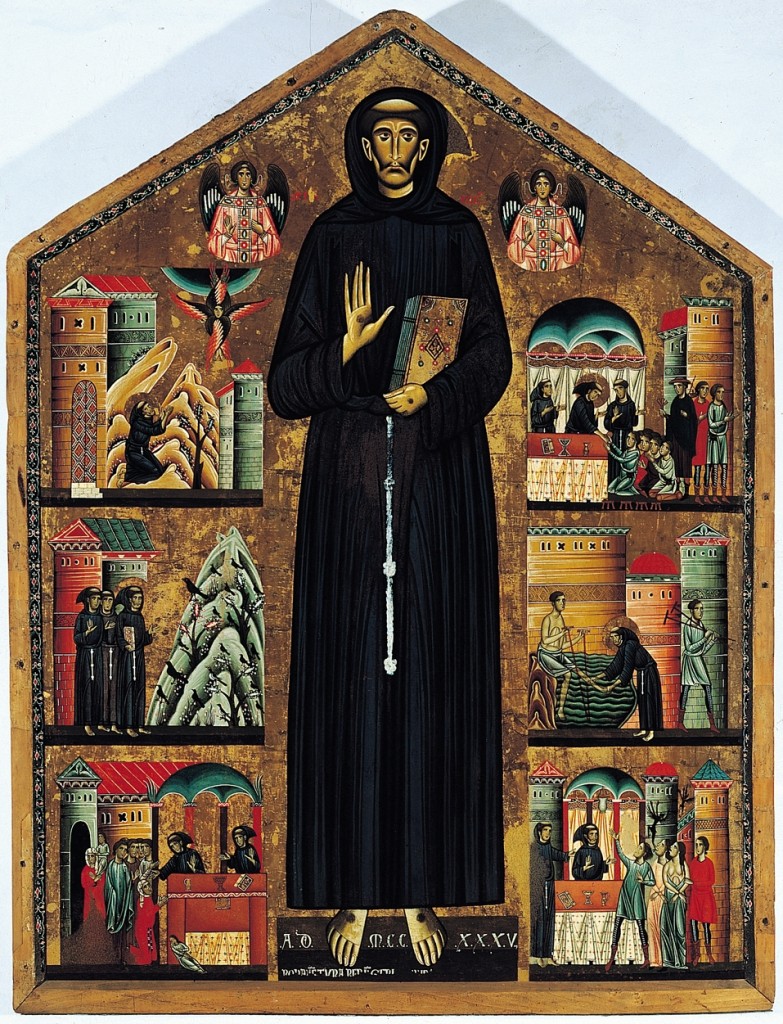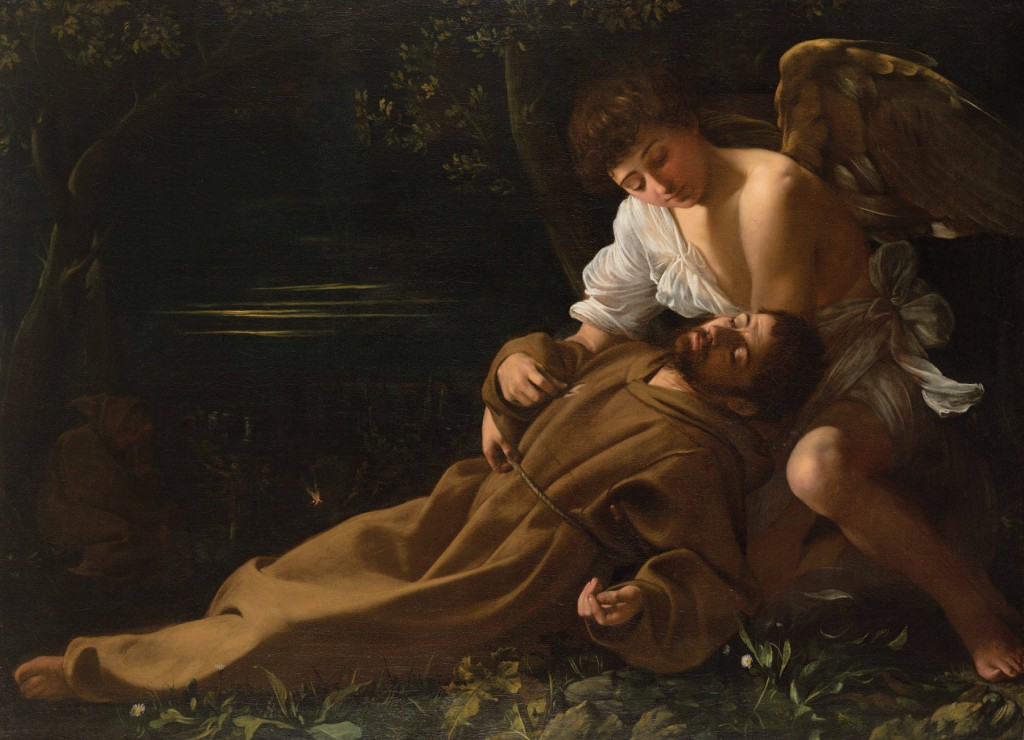For most moderns, devout worshipers or not, Saint Francis represents the appreciation of love of nature, of the physical world, of mere wonderful earth and fire and water. This was one of Francis’s discoveries, revelations. Of course the men of the early Middle-Ages recognized and loved natural beauty- flowers and bird song and graceful animals and sweet faces. But in their poems and paintings they conventionalized beauty. In their lyric poems the year was perpetually Maytime, with unnamed flowers blooming and unspecified birds caroling. Their paintings, still rigidly Byzantine, shoed backgrounds of formalized rocks and chasms. Francis’s nature was a reality, alive, diverse, conscious of its creator and responsive to Him. It was observed in love, and celebrated with joy.

1235. Bonaventura Berlinghieri painted a large panel with scenes from Saint Francis’s life. —October 4th is St. Francis of Assisi’s feast day. Of course, this day provides inherent fun for children with the Blessing of the Animals (and stuffed animals!), which is done in some homes and at many churches. Because traditions, legends and inspiration regarding St. Francis is so prolific, it is also a day that offers an array of other ways to celebrate….Read More:http://www.catholicmothersonline.com/2011/09/10-ideas-for-celebrating-st-francis-of-assisi-with-young-ones/
At San Damiano, then, back in 1244, Francis dictated the “Song of the Creatures,” with an accompanying melody, which has been lost. Chiara was certainly one of the first to hear it. He then did nothing but sing his canticle for a week. He proposed to send a group of friars from village to village, preaching; and after the sermon they would all chant his poem. Francis was not devoid of author’s vanity.
Now it happened that at this time Francis’s old friend and patron, Bishop Guido of Assisi, was enjoying a bitter quarrel with the mayor, Oportulo. The mayor had fined some of the bishop’s adherents; the bishop excommunicated the mayor; the mayor forbade all citizens to speak to the bishop, to deal with him or to bring him food.

—Michelangelo Merisi da Caravaggio (Italian, 1571-1610). Saint Francis in Ecstasy, ca. 1594-95. Oil on canvas. 36 3/8 × 50 5/16 in. (92.5 × 127.8 cm). The Ella Gallup Sumner and Mary Catlin Sumner Collection Fund.
Wadsworth Atheneum Museum of Art, Hartford, Connecticut—Read More:http://arthistory.about.com/od/from_exhibitions/ig/Caravaggio-in-Rome/02-Caravaggio-Saint-Francis-in-Ecstasy-1594-95.htm
Francis grieved that his Christian friends should so yield to un-Christian behavior. He summoned one of the brothers and said: “Go to see the Mayor and tell him from me to proceed to the Bishop’s palace with the notables of the commune.” ; evidently taking as a matter of course his right to command the masters of church and state. Then he ordered the brothers to join the assemblage and at the right moment to demand silence and to sing his canticle in praise of the Lord for all His creatures; and at the end to add this stanza:
We praise Thee for those who for thy sake forgive,
Whom sorrow and sickness will never cast down,
Who in peace persevering will resolute live;
They shall merit thy crown.

—Saint Francis with the Animals portrays a wooded landscape, verdant with a bounty of various animals, fish, and birds. The work’s media of oil on copper provided the artists, Lambert de Hondt the Elder and Willem van Herp the Elder, with the perfectly smooth surface required for a painting of such precise detail.
The Entry of the Animals into Noah’s Ark appears to be a variant of a ‘paradise landscape’ which portrayed the Garden of Eden as described in the Book of Genesis, abundant with all the animals, fish, and birds that God created. These landscapes were popularized by Jan Brueghel and, compositionally, the present picture broadly imitates many of Brueghel’s paradise landscapes, such as The Creation with Adam or The Entry of the Animals into Noah’s Ark. Jan Breughel developed his familiarity with exotic animals through his employment in the court of the Archdukes Albert and Isabella in Brussels, who maintained an extensive animal menagerie, and his time spent in his hometown of Antwerp, a major port city and trade center for goods from Asia and the New World. De Hondt certainly drew inspiration from these paintings as well from the work of Rubens and there is a particular similarity between the depiction of the lions in this picture and those in Daniel in the Lion’s Den by Rubens.
We are grateful to Dr Marijke de Kinkelder of the RKD for her attribution of the present work to Lambert de Hondt the Elder and Willem van Herp the Elder.—Read More:http://www.haldanefineart.com/cataloguing/de-hondt-lambert-saint-francis.html
The praise was directed significantly at the quarreling officials, but surely Francis was thinking of his own fate. The party duly assembled and the stanza of pardon was sung. The mayor clasped his hands as for the reading of the Gospel, and he wept abundantly. And he proclaimed: “Not only do I pardon the Bishop, whom I must recognize as my master, but I would pardon the murderer of my brother or of my son!” He knelt and begged the Bishop for forgiveness. The bishop raised him up, saying: ” My office require humility, but I am testy-tempered by nature; you must pardon me.” So both embraced and exchanged the kiss of peace, with much tenderness and affection.
The incident illustrates the power of Christian love, and also Francis’s use of love to persuade and command. Love is the clue to Francis. He loved all the aspects of the external world, from sun, moon, earth, and fire, water to insects and stones in the road. He especially loved living creatures, and of them especially birds. Besto f the birds to him were the cowled larks, earth-colored like monks, and humble, but such sweet singers!
The larks returned his love. On the night before his death a great multitude came and wheeled above his roof, singing their farewell. On another occasion a swarm of birds- wood pigeons, crows, rooks- assembled on a tree to hear his sermon, and at the end bowed their heads reverently. He tamed many birds for pets, or rather companions- his familiar hawk at La Verna
loving moor hen, a family of robins, one of whom suffered death as penalty for gluttony.




 COMMENTS
COMMENTS